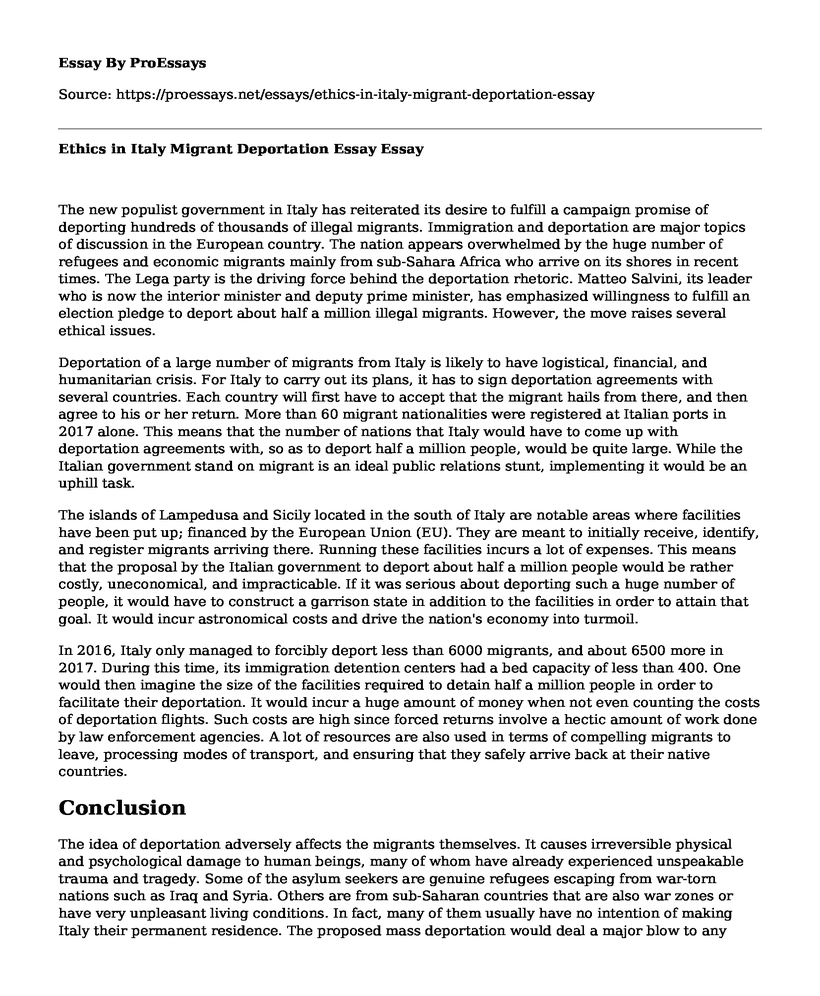The new populist government in Italy has reiterated its desire to fulfill a campaign promise of deporting hundreds of thousands of illegal migrants. Immigration and deportation are major topics of discussion in the European country. The nation appears overwhelmed by the huge number of refugees and economic migrants mainly from sub-Sahara Africa who arrive on its shores in recent times. The Lega party is the driving force behind the deportation rhetoric. Matteo Salvini, its leader who is now the interior minister and deputy prime minister, has emphasized willingness to fulfill an election pledge to deport about half a million illegal migrants. However, the move raises several ethical issues.
Deportation of a large number of migrants from Italy is likely to have logistical, financial, and humanitarian crisis. For Italy to carry out its plans, it has to sign deportation agreements with several countries. Each country will first have to accept that the migrant hails from there, and then agree to his or her return. More than 60 migrant nationalities were registered at Italian ports in 2017 alone. This means that the number of nations that Italy would have to come up with deportation agreements with, so as to deport half a million people, would be quite large. While the Italian government stand on migrant is an ideal public relations stunt, implementing it would be an uphill task.
The islands of Lampedusa and Sicily located in the south of Italy are notable areas where facilities have been put up; financed by the European Union (EU). They are meant to initially receive, identify, and register migrants arriving there. Running these facilities incurs a lot of expenses. This means that the proposal by the Italian government to deport about half a million people would be rather costly, uneconomical, and impracticable. If it was serious about deporting such a huge number of people, it would have to construct a garrison state in addition to the facilities in order to attain that goal. It would incur astronomical costs and drive the nation's economy into turmoil.
In 2016, Italy only managed to forcibly deport less than 6000 migrants, and about 6500 more in 2017. During this time, its immigration detention centers had a bed capacity of less than 400. One would then imagine the size of the facilities required to detain half a million people in order to facilitate their deportation. It would incur a huge amount of money when not even counting the costs of deportation flights. Such costs are high since forced returns involve a hectic amount of work done by law enforcement agencies. A lot of resources are also used in terms of compelling migrants to leave, processing modes of transport, and ensuring that they safely arrive back at their native countries.
Conclusion
The idea of deportation adversely affects the migrants themselves. It causes irreversible physical and psychological damage to human beings, many of whom have already experienced unspeakable trauma and tragedy. Some of the asylum seekers are genuine refugees escaping from war-torn nations such as Iraq and Syria. Others are from sub-Saharan countries that are also war zones or have very unpleasant living conditions. In fact, many of them usually have no intention of making Italy their permanent residence. The proposed mass deportation would deal a major blow to any lingering claim the country still wish to stick to on being a liberal democratic state.
References
Carens, J. H. (2016). The Ethics of Immigration Revisited: Response to Brock, Fabre, Risse and Song. Journal of Applied Philosophy, 33(4), 457-466.
Lenard, P. T. (2015). The ethics of deportation in liberal democratic states. European Journal of Political Theory, 14(4), 464-480.
Winfield, N. (2018, June 2). New Italian govt vows to create jobs, deport migrants. Retrieved from https://www.washingtonpost.com/world/europe/italy-national-pride-on-display-after-political-crisis-ends/2018/06/02/c96f0908-6656-11e8-81ca-bb14593acaa6_story.html?noredirect=on&utm_term=.09d5878ebc60
Cite this page
Ethics in Italy Migrant Deportation Essay. (2022, Jun 17). Retrieved from https://proessays.net/essays/ethics-in-italy-migrant-deportation-essay
If you are the original author of this essay and no longer wish to have it published on the ProEssays website, please click below to request its removal:
- Artificial Intelligence and Theory of Mind Essay Example
- Homelessness in the United States Paper Example
- Paper Example on U.S. Political Parties: The Trump Era and Its Impact on Business
- Essay Sample on Developing Professional Identity: Factors & Processes
- Essay Example on Post-Racial America? Uncovering Racism's Lingering Effects
- Report Example on Texas Prison Health Care Cost
- Book Review Sample on Rappaccini's Daughter: Complete Spectrum of Human Morality







